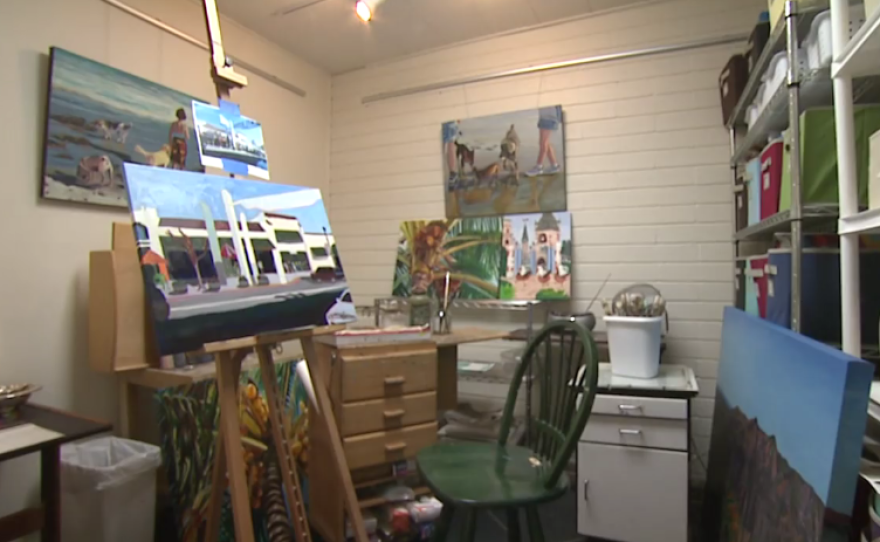This is KPBS midday edition, I am a Maureen Cavanaugh. You go to college, major in some area of the arts like painting, acting or playing the harpsichord. You get into the real world and find you can support yourself and go into real estate. That scenario or something like it has dampened the hopes and dreams of many aspiring artists. The small band of true believers who do pursue there artistic ambitions either become wildly successful or are doomed to be starving artists. But there is now a third way according to a San Diego State University accounting lecture developing a business model that allows writers, sculptors, filmmakers and all sorts of authors to do with a love and get paid for it. Joining me is John Baumunk, he is an STS you accounting lecturer and taught entrepreneurship. Welcome to the program. Patric Stillman is an acrylic painter and photographer founder of the studio door and arts incubator in San Diego, Patrick, welcome. John, what got you interested in how artists can make a l iving? This fall I'm going to be teaching a course as part of a program of study at the Evergreen State College in Olympia Washington. As part of my preparation for this, I started to look into how artists are a lot like entrepreneurs we think of in a more traditional sense. Artists need to make money just like an entrepreneur needs to make money, but their work goes beyond making a profit. There is value to an artist's work besides just the amount of dollars that it brings him. What are some of the difficulties facing artists when it comes to making money from their art? I think artists tend to think of themselves as being craftspeople and that their crap will sell itself. Artist need to think in terms of the business model and have some sort of a plan in mind when they begin a project or when they begin their career as an artist. They need to develop budgets and think about protecting themselves legally in the need to think about marketing in using a network to leverage their skills and develop a brand for themselves. John, have viewed by Zen said artist to determine what kind of art or painting or writing or what kind of music will actually sell? There are art should be an expression of their selves in something they believed in. I don't think artists should compromise who they are and make art in a sense sell it. What they need to do is market what they do and develop an audience that will follow them much the same way that for example there are hordes of people that follow the Grateful Dead, an artist needs to develop a following of there own and from that following, they need to attract funding for their work from the people who appreciate it. So what you're saying instead of the IDF trying to find that niche work that will sell that may be conflicts with your own creative spirit, it is to make people realize they actually want what you are doing. If what you do speaks to you it should speak to somebody else. If you do what you believe in and what you are passionate about you would do a good job at it and as a result others will see that value and come to it. At the same time what you need to do is have something that actually sells. One of the things I advise aspiring entrepreneurs to do is go out and try to sell their product or in the case of an artist, go out and try to sell the work you do. See if somebody will pay you money for it or if somebody will find it if you are seeking donations or some sort of a grant. Patrick, you're a painter and photographer, what's it been like to try to keep body and soul together doing art? It's been an interesting p ath. I think about 10 years ago I started dedicating myself to my craft and I realized very quickly it is daunting. There is no set path. What I learned was when I surrounded myself with other artists, I really began to captivate on all of their experiences and from there, the seeds of the studio door actually came to life. How do you price your artwork? How do you do with galleries? How do you market yourself? These are all things artists don't necessarily spend a lot of time on. They love to create but if you are just in your studio creating by yourself, then you're not getting your message out to the world. This is exciting to hear about marketing and business ideas. You said about 10 years ago you decided to dedicate yourself to your craft, had you put aside some of your artistic ambitions before then thinking maybe it just wasn't going to work out practically? I think the advice I got from my father was don't quit your day job. Most of my life I spent on the practical side doing business, working in nonprofits and about 10 years ago I said I'm missing out on something I believed in myself years ago and that was my creative talents. I decided to take time and make it happen. With the other artists you have been able to talk with and collaborate with, what are they doing to try to be able to make a living besides the kind of business plan we are talking about with John. Do they have second jobs? What are they doing to support themselves? The artists are all over the place. We've got students, mothers who are stay-at-home. We a people who have full-time jobs in people who were freelancing. I'm finding not only dedicating time to your craft the dedicating time to marketing is key. I'm finding the artists I work with I'm finding opportunities through there creative side to freelance and I think that is an empowering way to keep creativity all the time. Let me starting with you John, is any of this stuff taught in art school or drama school how to support yourself as an artist? I think students really need to create there own path in terms of taking business c ourses. Taking a wide variety of c ourses. I think a student who just focuses on courses that heightened there proficiency and their craft and there expertise maybe shortselling themselves to some extent. A liberal arts college such as the Evergreen State College tends to focus more on the broader students and look at many different disciplines so the aspiring artist can draw upon their knowledge of b usiness, history and psychology and find solutions that may be outside a specific discipline. Did you get any instruction, Patrick besides keeping your day job? I think I started to use the practical experience I learned in business and marketing. There were some things that came to me. One is freelancing is a possibility, internships with museums and galleries is a good option to gain experience.Certainly the socialization with other artists and finding information. And working hard on developing my own portfolio and looking at what's out there online as well is in my community. Where the areas you find artists really lack an understanding what it comes to business and selling from your experience at the studio door? I think many artists look at business and think that the warble thing, that has nothing to do with me. In today's world, it is a key part of getting your word and your art seen and experienced by others. John, when you say it's essential for artists to have a business plan, what should it include? There are several different areas, one of which is the accounting area which is something I happen to teach. What artists need to have in mind is what they can get for their art in terms of monetary compensation from whatever source. The other thing is they need to keep track of their cost and do what they can to reduce those costs and keeping track is the first way to reduce them. There are things they can do such as sharing or bartering that might enable them to lower their costs. The other big areas, they need to protect themselves legally. Artists may enter into contracts and those contracts may be narrow in scope or broad in scope and they may require the artist to give up a significant portion of the profits they have from their art. The other areas of course our intellectual property on the legal side and property should be protected in should not infringe among the intellectual property rights others have as well. The third major area, and I think the key piece is the marketing side. Finding somebody who will fund what they are doing is critically important and that also involve networking and as Patrick mentioned, creativity. I think there is a natural synergy between artists who tend to be creative people and entrepreneurs who are also creative. I think the key thing is to harness that created aspect into the business side of things. You also talked about formulating some realistic goals when it comes to what you were doing and how much you can actually pull in the kind of art you are producing. The important thing is to perhaps cut your risk and minimize your risk to some extent because every artist or at least they artists may want to have there own studio but having your own studio is going to be very expensive. Perhaps of the aspiring artist were to think about having a studio in their home or having a studio in a liquidation that is so expensive. That might be a better way to start out that in the more high-profile kind of way. John, it sounds like you encourage the kind of collaboration Patrick has set up which is studio door incubator. I think what Patrick is doing is wonderful and that encourages synergies and cutting costs and encourages something vitally important which is networking with other artists and sharing ideas and also sources of funding. Patrick, can you give us an idea of how your own career as a painter and photographer has grown through using some of these methods of getting the word out, social networking and so forth? One of the things I created was a digital photograph deck and I have had success in selling that across the world using social media. More recently, my digital photography has been accepted in exhibition at the Louvre in J uly. That wouldn't have been possible without new technologies. The studio door is working hard on the programmatic side to help artists with those tools and essential business skills and interests programming bring up San Diego arts all the way. We just had a 50 to watch publication we created which was digitally printed and it's gone out to over 2000 galleries across the country. So just getting it out there and the fact you exist and you are creating some art. Making some noise. John, Patrick brings up an important point. There have been fundamental changes in the arts industry. It is artists, musicians and writers who used to get representation are now having to get their names and their work out by themselves. Can you see this as a benefit as well is a challenge? It is a benefit in the sense the artist doesn't need to give a piece to what they are getting to somebody else so they can keep more of it. The problem with that is if there is a bigger pie, sometimes everybody benefits from that. If we have a pie that is 10 times the size and you end up splitting it in two, you're going to get a greater amount than if you had a 10th of the pie and you ended up eating all of it. Which way do you see it going at this point? Do you see people are going to be a look to split that pie into smaller and smaller slices and not be able to make a living? As Patrick mentioned, the new media is having a big impact because artists can now distribute for example their music on YouTube. It is just getting noticed through all the proliferation of others that want to do that as well. That's the challenging part. Having somebody represent you is of course a key thing to have that at the same time, you do need to give up something for that and I think artists when they enter into those agreements need to be careful about what they are giving up. For example in music, are they giving up rights related to their performances? Are they giving up rights related to other things they might create or other aspects of there persona that whoever is representing them would also get a piece of. It sounds like even a starving artist needs an accountant, is that right? And ad age is every business person should have a good accountant and a good lawyer. If I had to choose between the two I think getting a good lawyer would be the most important because of the long-term implications and the presented nature of good legal representation. The analogy might be sort of going to the hospital, when you have a health problem that could have easily been taking care of if preventive measures have been taking care of earlier. Patrick, as a painter and owner and founder of the studio door, have you solved the problem of being a starving artist -- starving artist? I believe we are at the beginning phase of the studio door and the proof is forthcoming as we move along. I believe you have to have the essential business skills in order to make it as an artist and we are certainly providing that. I want to thank you both. I've been speaking with John Belmont and artist Patric Stillman, founder of the studio door and arts incubator. Thank you both very much.
Artists and accounting experts in San Diego are helping creative minds survive as artists.
The first step to making a living while following their passion for creating art is to have a business plan just like any other business, said San Diego State University accounting lecturer Jon Baumunk.
"Artists are entrepreneurs but sometimes they don't know that,” Baumunk said. “They think of themselves as the creative type. But in order to make a living they need to get others to pay them for their art.”
He says an artist’s business plan needs to include marketing as part of the strategy to generate sales.
"A business plan should have sound financials, ways to protect yourself legally and it must have a product that people will pay you money for," Baumunk said.
San Diego artist Patric Stillman says it is difficult for an artist to get up and running.
"They have the creativity but they find themselves lacking on the essentials skills needed to get their message out to the world,” Stillman said.
He runs what he calls an "arts incubator" in North Park called The Studio Door. It's an art gallery and visual arts center with an Art-to-Market program that helps promote local artists. Artists collaborate, network and learn basics needed for running a business: everything from what type of lighting to use on their art to how to market and use social media.
Since many artists work alone, in solitude, the incubator is a place where they can collaborate, share ideas and discuss successes.
To find out if you can make a living through your art, Baumunk says look at the economics.
"Figure out what you need to live on and then how to get there," he said.
Stillman is also a painter. He says it’s difficult for some artists because for them, it’s about creating.
"I tell artists if you're creating art in your own studio or bedroom and not sharing it with the world - then you're not completing your mission as an artist," Stillman said. "You have a voice, people need to hear it."
Baumunk and Stillman explain how meshing the creative world with a business model can result in profits for an artist Wednesday on Midday Edition.







